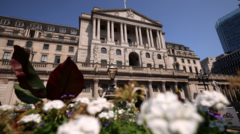Will the Bank of England Lower Interest Rates Soon?

Understanding the Implications of Expected UK Interest Rate Cuts
The UK economy is poised for significant changes as the Bank of England prepares to announce a reduction in interest rates. Financial markets anticipate that interest rates will drop from 4.25% to 4%, marking the fifth cut since August of the previous year. This anticipated shift will have far-reaching implications for both borrowers and savers alike. As we delve into the details, it’s essential to understand how these changes may affect various sectors of the economy, especially in light of the recent economic performance indicators.
The Current Economic Landscape
April and May saw the UK economy stagnate, failing to post any growth during these months. This lack of economic activity has raised concerns about a widening spending gap, which could compel the government to consider tax increases in the upcoming Autumn Budget. The anticipation of a rate cut comes at a time when the economy has demonstrated minimal growth, having only expanded by 0.7% in the first quarter of the year. The forthcoming data release from the Office for National Statistics will provide further insight into the economy's performance from April to June.
Impact on Borrowers: Mortgage Rates
For homeowners, a reduction in the Bank of England's base rate can lead to decreased monthly mortgage payments. According to financial data firm Moneyfacts, if rates are lowered, the repayments on an average standard variable rate mortgage of £250,000 over 25 years could see a reduction of approximately £40 per month. This relief could be a significant factor for many households currently navigating financial pressures.
The Balancing Act for Savers
While borrowers may benefit from lower repayment amounts, the situation is less favorable for savers. The average return on savings accounts is expected to decrease from 3.9% in August of last year to around 3.5%, according to Moneyfacts. Rachel Springall, a finance expert at Moneyfacts, has pointed out that these declining savings rates are likely to bring further difficulties for individuals relying on interest income from their savings. For many, this could mean reassessing their financial strategies and exploring alternative investment options.
Inflation and Employment Trends
Complicating matters is the fact that inflation continues to rise, with recent figures indicating a jump to 3.6% in the year leading up to June. This increase is attributed to higher costs of essential goods, including food and clothing, as well as services such as air and rail travel. Despite these inflationary pressures, the Bank of England appears to be prioritizing rate cuts, aiming to stimulate economic growth in a cooling labor market.
Understanding Employment Dynamics
Recent labor market statistics reveal a cooling trend, with a decrease in the number of people on payrolls and a rise in the jobless rate. Additionally, job vacancies have diminished, indicating a potential slowdown in hiring. The annual growth in average regular earnings, excluding bonuses, has also decelerated to 5% between March and May. Employers are grappling with heightened costs, including increased National Insurance Contributions and the national minimum wage, which may contribute to the cooling labor market.
What to Expect from the Upcoming Bank of England Decision
The upcoming announcement from the Bank of England is one that many will be watching closely. Scheduled for 12:00, the decision will be accompanied by expert analysis to help interpret the implications for individual finances and the broader economy. Understanding the context of this decision is crucial, especially for those who may be impacted by changes in interest rates.
The Broader Economic Implications
Rate cuts could be seen as a necessary measure to encourage spending and investment within the economy. Lower borrowing costs can stimulate consumer spending, which is vital for economic recovery. However, policymakers must also consider the potential drawbacks of lower interest rates, particularly for savers and the long-term effects on inflation.
Strategies for Borrowers and Savers
As the economic landscape shifts, both borrowers and savers need to explore strategies that align with the changing environment. Here are some tips for managing finances in light of potential rate cuts:
- For Borrowers: Consider refinancing options to lock in lower rates, if available. Evaluate fixed-rate mortgages to safeguard against future rate fluctuations.
- For Savers: Diversify your savings portfolio. Look for high-interest savings accounts or consider alternative investment vehicles that may offer better returns.
- Budget Wisely: Regardless of interest rates, maintaining a well-structured budget can help manage expenses effectively and facilitate savings.
Conclusion: Navigating the Changing Financial Landscape
The anticipated interest rate cut by the Bank of England represents a significant moment for the UK economy. While borrowers may find relief in lower mortgage repayments, savers face challenges with declining returns. The broader economic context, including inflation and employment trends, will play a critical role in shaping the future financial environment.
As we approach the announcement, it is essential for individuals to stay informed and agile in their financial strategies. How will you adapt to potential changes in interest rates, and what steps will you take to secure your financial future? #InterestRates #UKEconomy #FinancialPlanning
FAQs
What will happen to mortgage rates if the Bank of England cuts interest rates?
If the Bank of England cuts interest rates, borrowers with standard variable rate mortgages may see their monthly repayments decrease, providing some financial relief for homeowners.
How will interest rate cuts affect savers?
Interest rate cuts typically lead to lower savings account returns, which can be detrimental for savers relying on interest income. It's essential to explore alternative savings options that may offer better returns.
Why is inflation still a concern despite expected rate cuts?
Although rate cuts aim to stimulate economic growth, rising inflation remains a concern. Higher costs for essential goods and services can undermine consumer purchasing power, complicating the economic landscape.
What should I do to prepare for potential changes in interest rates?
Consider reviewing your financial situation, including mortgage options and savings plans. Staying informed and being proactive can help you navigate potential economic changes effectively.
Published: 2025-08-06 23:10:12 | Category: technology



